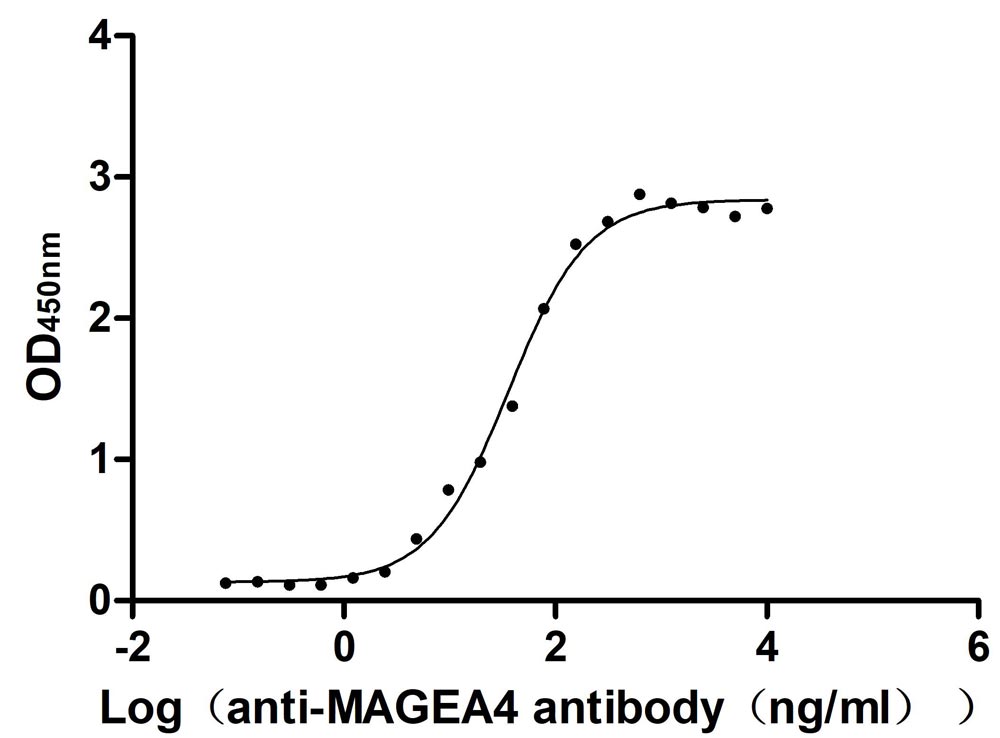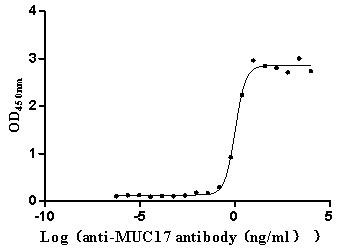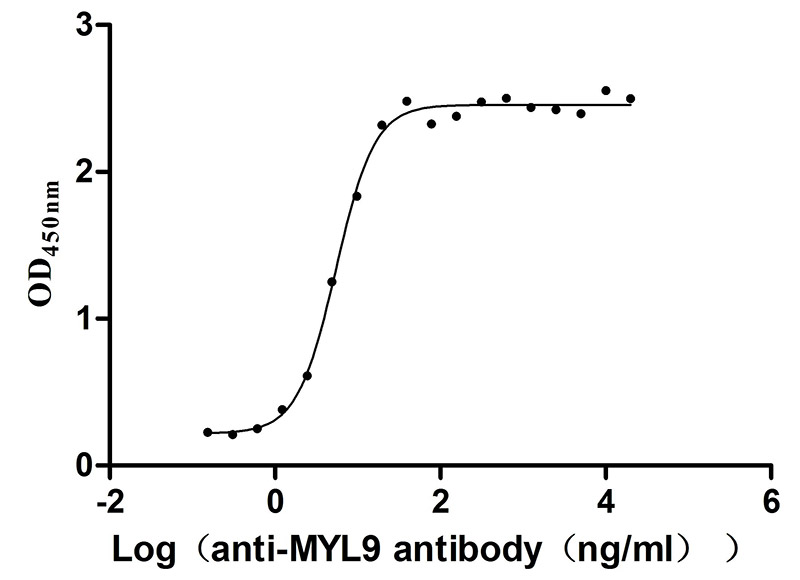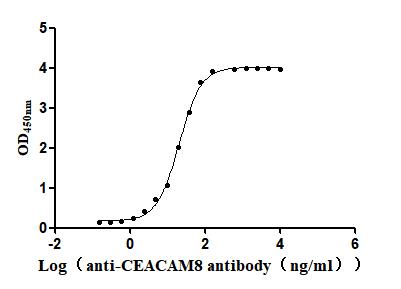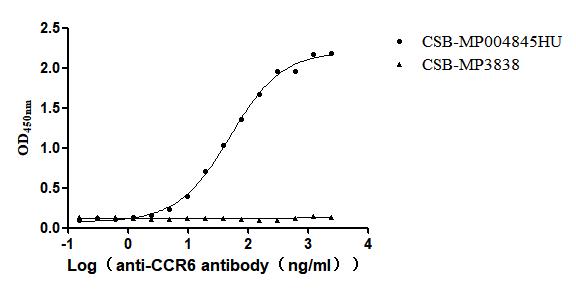Recombinant Mouse Tankyrase-2 (Tnks2), partial
-
中文名稱:小鼠Tnks2重組蛋白
-
貨號:CSB-EP664937MO-B
-
說明書:
-
規格:
-
來源:E.coli
-
共軛:Avi-tag Biotinylated
E. coli biotin ligase (BirA) is highly specific in covalently attaching biotin to the 15 amino acid AviTag peptide. This recombinant protein was biotinylated in vivo by AviTag-BirA technology, which method is BriA catalyzes amide linkage between the biotin and the specific lysine of the AviTag.
-
其他:
產品詳情
-
純度:>85% (SDS-PAGE)
-
基因名:Tnks2
-
Uniprot No.:
-
別名:Tnks2; Tank2; Poly [ADP-ribose] polymerase tankyrase-2; EC 2.4.2.30; ADP-ribosyltransferase diphtheria toxin-like 6; ARTD6; Protein poly-ADP-ribosyltransferase tankyrase-2; EC 2.4.2.-; TNKS-2; TRF1-interacting ankyrin-related ADP-ribose polymerase 2; Tankyrase II; Tankyrase-2; TANK2
-
種屬:Mus musculus (Mouse)
-
蛋白長度:Partial
-
蛋白標簽:Tag?type?will?be?determined?during?the?manufacturing?process.
The tag type will be determined during production process. If you have specified tag type, please tell us and we will develop the specified tag preferentially. -
產品提供形式:Lyophilized powder
Note: We will preferentially ship the format that we have in stock, however, if you have any special requirement for the format, please remark your requirement when placing the order, we will prepare according to your demand. -
復溶:We recommend that this vial be briefly centrifuged prior to opening to bring the contents to the bottom. Please reconstitute protein in deionized sterile water to a concentration of 0.1-1.0 mg/mL.We recommend to add 5-50% of glycerol (final concentration) and aliquot for long-term storage at -20℃/-80℃. Our default final concentration of glycerol is 50%. Customers could use it as reference.
-
儲存條件:Store at -20°C/-80°C upon receipt, aliquoting is necessary for mutiple use. Avoid repeated freeze-thaw cycles.
-
保質期:The shelf life is related to many factors, storage state, buffer ingredients, storage temperature and the stability of the protein itself.
Generally, the shelf life of liquid form is 6 months at -20°C/-80°C. The shelf life of lyophilized form is 12 months at -20°C/-80°C. -
貨期:Delivery time may differ from different purchasing way or location, please kindly consult your local distributors for specific delivery time.Note: All of our proteins are default shipped with normal blue ice packs, if you request to ship with dry ice, please communicate with us in advance and extra fees will be charged.
-
注意事項:Repeated freezing and thawing is not recommended. Store working aliquots at 4°C for up to one week.
-
Datasheet :Please contact us to get it.
靶點詳情
-
功能:Poly-ADP-ribosyltransferase involved in various processes such as Wnt signaling pathway, telomere length and vesicle trafficking. Acts as an activator of the Wnt signaling pathway by mediating poly-ADP-ribosylation of AXIN1 and AXIN2, 2 key components of the beta-catenin destruction complex: poly-ADP-ribosylated target proteins are recognized by RNF146, which mediates their ubiquitination and subsequent degradation. Also mediates poly-ADP-ribosylation of BLZF1 and CASC3, followed by recruitment of RNF146 and subsequent ubiquitination. Mediates poly-ADP-ribosylation of TERF1, thereby contributing to the regulation of telomere length. Stimulates 26S proteasome activity.
-
基因功能參考文獻:
- Tank1/Tank2 inhibition aggravates kidney injury in the absence of CD2AP. PMID: 27441654
- These structural insights will be invaluable for the functional and biophysical characterization of TNKS1/2, including the role of TNKS oligomerization in protein poly(ADP-ribosyl)ation (PARylation) and PARylation-dependent ubiquitylation. PMID: 27328430
- TNKS2 is required in insulin-stimulated glucose disposal. PMID: 22473005
- Study shows that TNKS2, regulates 3BP2 stability through ADP-ribosylation and subsequent ubiquitylation in osteoclasts; cherubism mutations uncouple 3BP2 from Tankyrase-mediated protein destruction. PMID: 22153076
- Data show that Tnks1 and 2 are broadly expressed during mouse development and are essential during kidney and lung development. In the kidney, blockage of tankyrase activity phenocopies the effect of blocking production of all Wnt ligands. PMID: 20549720
- inactivation of tankyrase 2 does not result in the alteration in telomere length when monitored through multiple generations of breeding, tankyrase 2 functions in potentially telomerase-independent pathways to affect overall development and/or metabolism. PMID: 16507984
- Tnks2 has a role in normal growth and development but is not essential for telomere length maintenance or telomere capping in mice. PMID: 16507985
- tankyrase 2is essential but redundant for mouse embryonic development PMID: 18612384
顯示更多
收起更多
-
亞細胞定位:Cytoplasm. Golgi apparatus membrane; Peripheral membrane protein. Nucleus. Chromosome, telomere.
-
數據庫鏈接:
Most popular with customers
-
Recombinant Human Poliovirus receptor (PVR) (I340M), partial (Active)
Express system: Mammalian cell
Species: Homo sapiens (Human)
-
Recombinant Human Melanoma-associated antigen 4 (MAGEA4) (Active)
Express system: Mammalian cell
Species: Homo sapiens (Human)
-
Recombinant Rat Intestinal-type alkaline phosphatase 1 (Alpi) (Active)
Express system: Mammalian cell
Species: Rattus norvegicus (Rat)
-
Recombinant Human Mucin-17 (MUC17), partial (Active)
Express system: Mammalian cell
Species: Homo sapiens (Human)
-
Recombinant Human Claudin-3 (CLDN3)-VLPs (Active)
Express system: Mammalian cell
Species: Homo sapiens (Human)
-
Recombinant Human Myosin regulatory light polypeptide 9 (MYL9) (Active)
Express system: Yeast
Species: Homo sapiens (Human)
-
Recombinant Human Carcinoembryonic antigen-related cell adhesion molecule 8(CEACAM8) (Active)
Express system: Mammalian cell
Species: Homo sapiens (Human)
-
Recombinant Human C-C chemokine receptor type 6(CCR6)-VLPs (Active)
Express system: Mammalian cell
Species: Homo sapiens (Human)


-AC1.jpg)
